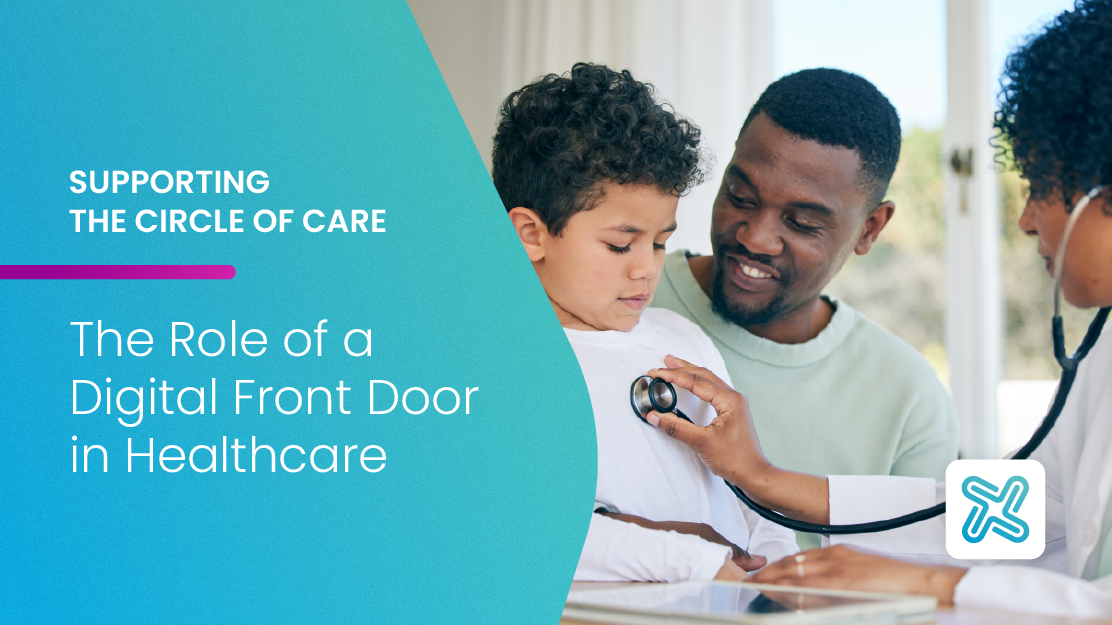The "circle of care" refers to the network of individuals—patients, family members, healthcare providers and caregivers—who collaborate to ensure a patient receives comprehensive and coordinated care. Understanding this concept is essential because it directly impacts both patient experiences and healthcare outcomes.
A well-functioning circle of care enhances communication, improves treatment continuity and fosters better health outcomes. However, communication challenges often arise within this network, leading to potential gaps in care and misalignment between providers and patients.
So, how does a digital front door help? By leveraging technology, a digital front door streamlines communication among all parties in the circle of care. It provides a secure platform for messaging, appointment scheduling and access to important health information. This connectivity empowers patients to engage actively in their care, keeps families informed and ensures providers have timely access to vital patient data.
In this article, we will explore the benefits of using a digital front door to enhance communication and support the entire circle of care, ultimately leading to improved health outcomes for all involved.
What is Ontario’s PHIPA Circle of Care?
Ontario’s Personal Health Information Protection Act (PHIPA) provides a set of rules for the collection, use, and disclosure of personal health information. Under the PHIPA, "health information custodians" (HICs)—such as a physician’s office or hospital—must treat all personal health information as confidential.
Individuals have a right to access their personal health information and instruct HICs not to share it with others. In fact, patient consent is required for the collection, use, and disclosure of almost all personal health information—with very few exceptions. That’s where the PHIPA circle of care comes in. Although “circle of care” isn’t explicitly defined in the PHIPA, the concept is central to understanding it.
The PHIPA circle of care consists of a strong, compassionate support network that forms around a person undergoing medical treatment or care, including providers, family, and caregivers. Members of a patient’s circle of care can assume a patient has consented to them collecting, using, and disclosing personal health information for the purpose of providing top-quality healthcare.
Challenges related to the circle of care typically involve communication breakdowns, which can occur even when all or most healthcare professionals work in the same building. Fortunately, technology can improve communication not only between caregivers but also among a patient’s entire circle of care.
How digital health technology strengthens the circle of care
The integration of digital health solutions, such as a digital front door, plays a crucial role in enhancing the circle of care. Acting as a virtual care companion, this technology helps foster better collaboration among patients, providers and caregivers. Here’s how it supports the healthcare journey:
Enhanced communication for seamless care
A digital front door improves communication between patients and healthcare providers, leading to a more integrated and patient-centered care experience. Through secure two-way messaging, patients, their families and care teams can stay connected outside of appointments, enabling real-time access to aftercare instructions, clinical support and follow-up care. This increased interaction boosts patient engagement and ensures smoother transitions within the circle of care.
Streamlined care management
With Akinox's digital health platforms, patients are guided to the appropriate level of care at the right time, optimizing the overall care management process. A digital front door allows patients to coordinate healthcare for themselves or loved ones, ensuring timely access to necessary services. This efficient care navigation reduces delays, enhancing health outcomes and streamlining the experience for both patients and providers.
Centralized health data for personalized care
A digital front door consolidates health records into a single platform, offering a comprehensive view of an individual’s health. By integrating clinical, personal, and lifestyle data, healthcare providers can deliver more personalized and accurate care. Centralizing this information fosters better collaboration within the circle of care, enabling more coordinated decision-making that improves overall care quality.
Enhanced data security and patient autonomy
Patient data security is a top priority in digital health. A digital front door empowers individuals to control their personal health information, deciding when and with whom to share it. This approach not only complies with privacy regulations like PHIPA (Personal Health Information Protection Act) but also strengthens trust in the healthcare system. Patients remain at the heart of their care, and secure data-sharing improves both communication and care coordination.
By adopting Akinox's digital health technologies, we can improve patient outcomes, enhance collaboration across care teams and strengthen the overall circle of care in the digital age.
Using Akinox’s Digital Front Door to Enhance Care
Using a digital front door not only supports the circle of care for each patient but also enhances care quality as a whole. Akinox’s digital front door—which is part of our virtual care platform—offers a wide range of features that facilitate efficient, personalized care.
Patients and caregivers gain access to customized care pathways, curated health and self-help education, patient-centric tools such as appointment scheduling and secure, direct messaging with providers. As a result, the entire circle of care is supported, connected and empowered to deliver the best patient experience possible.
Want to find out more about our digital solutions? Contact us now!

